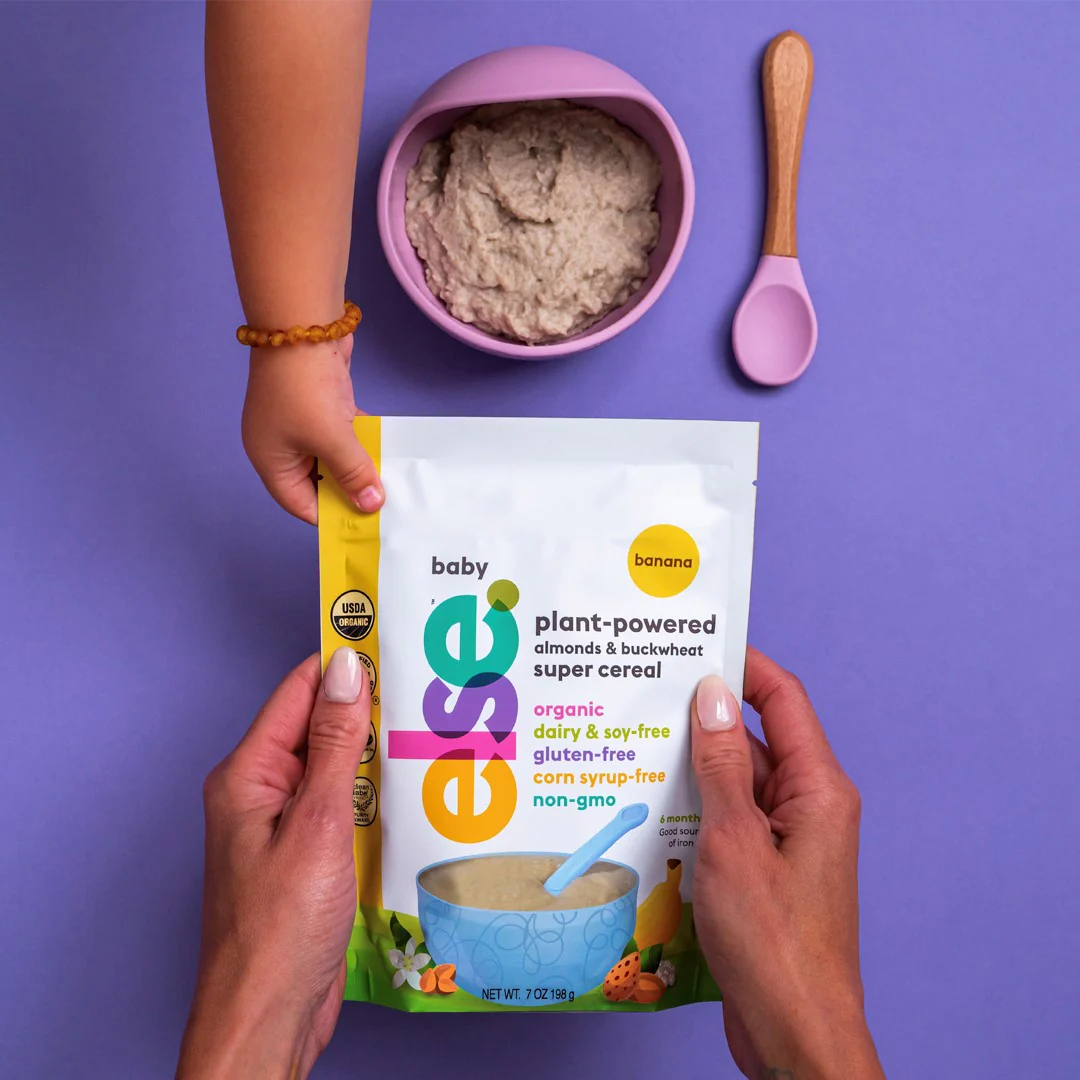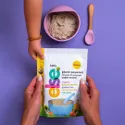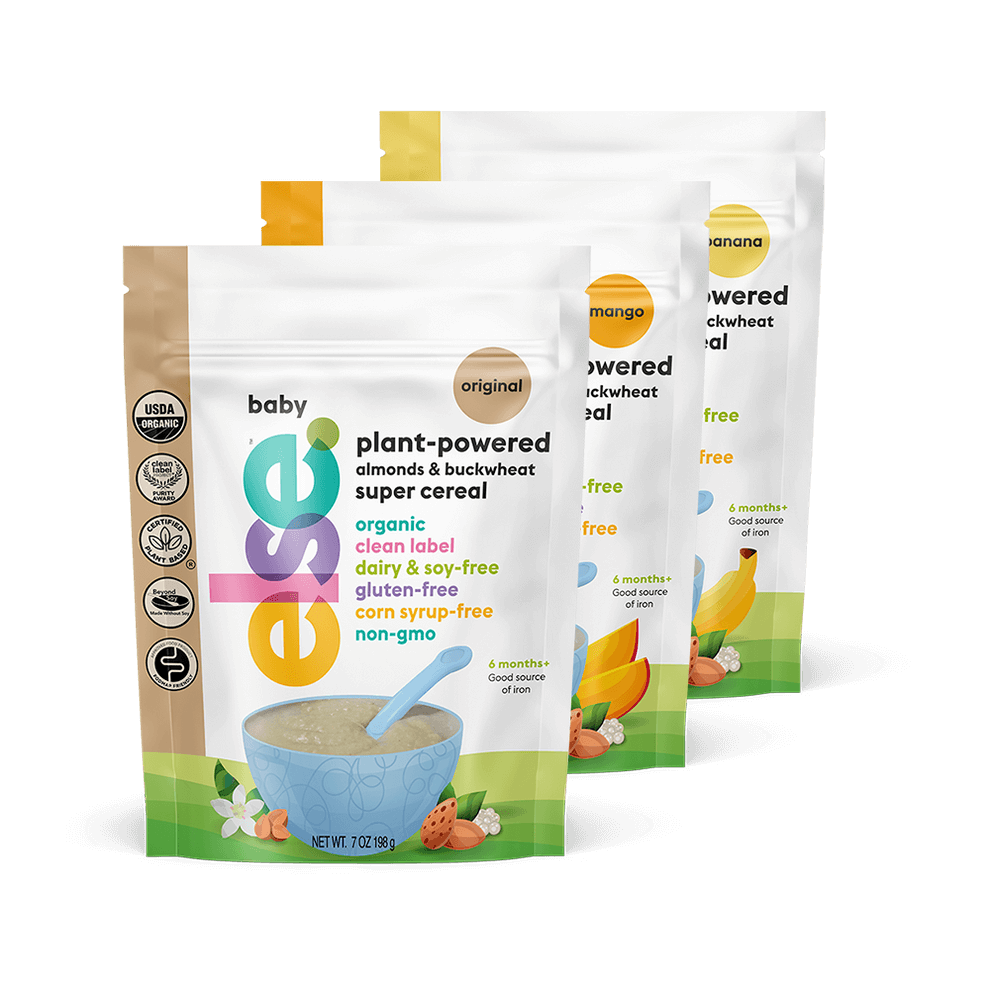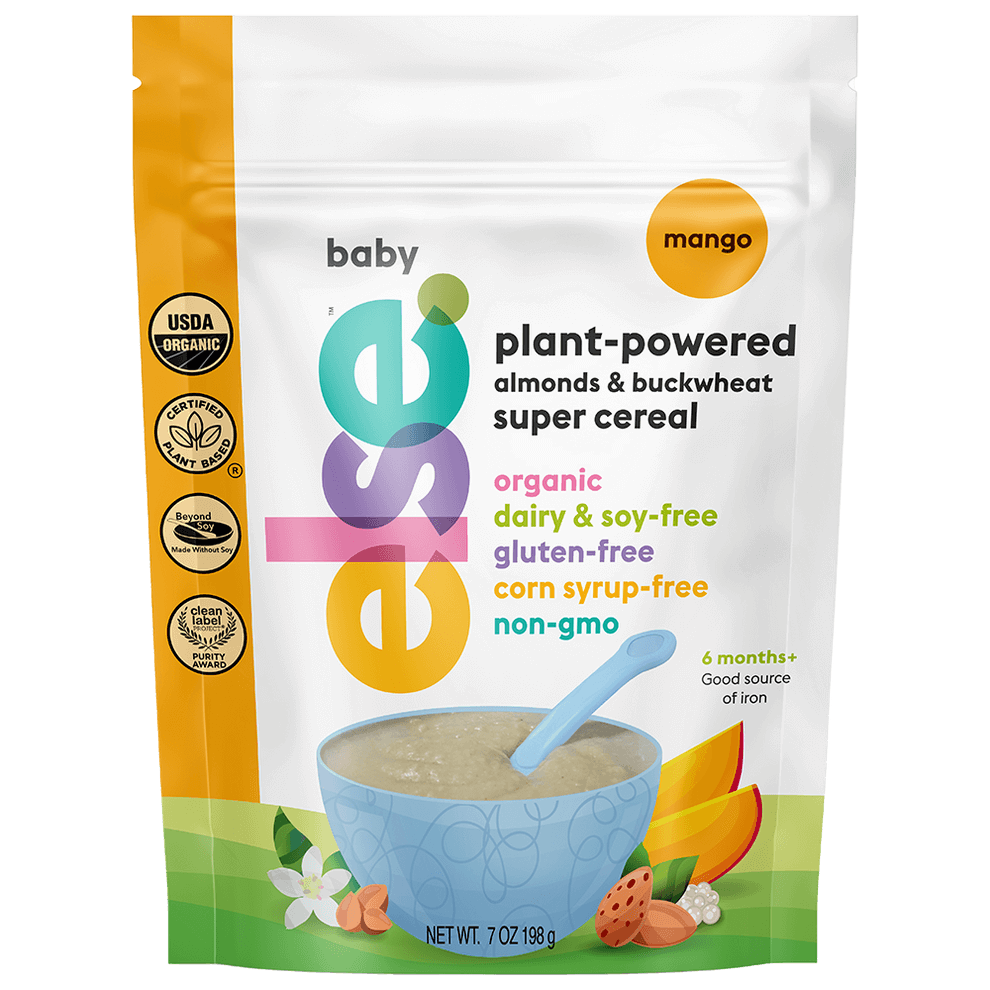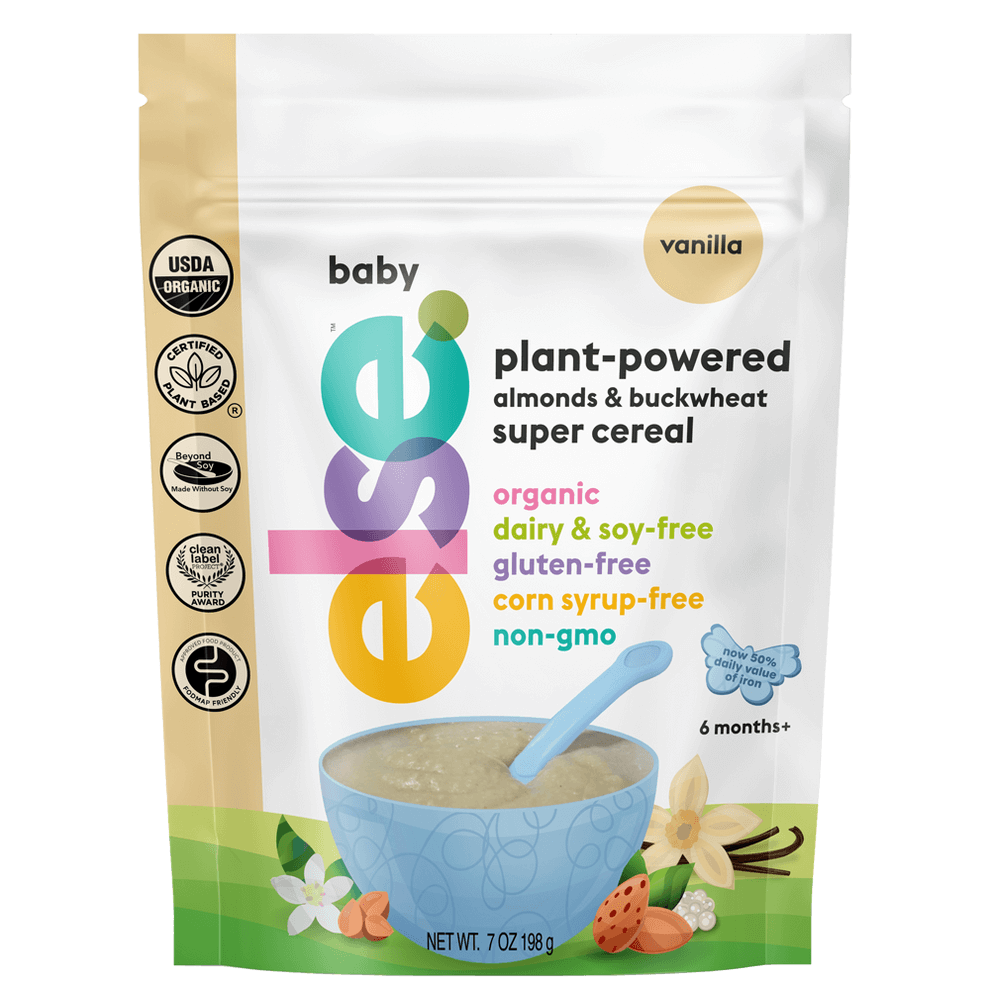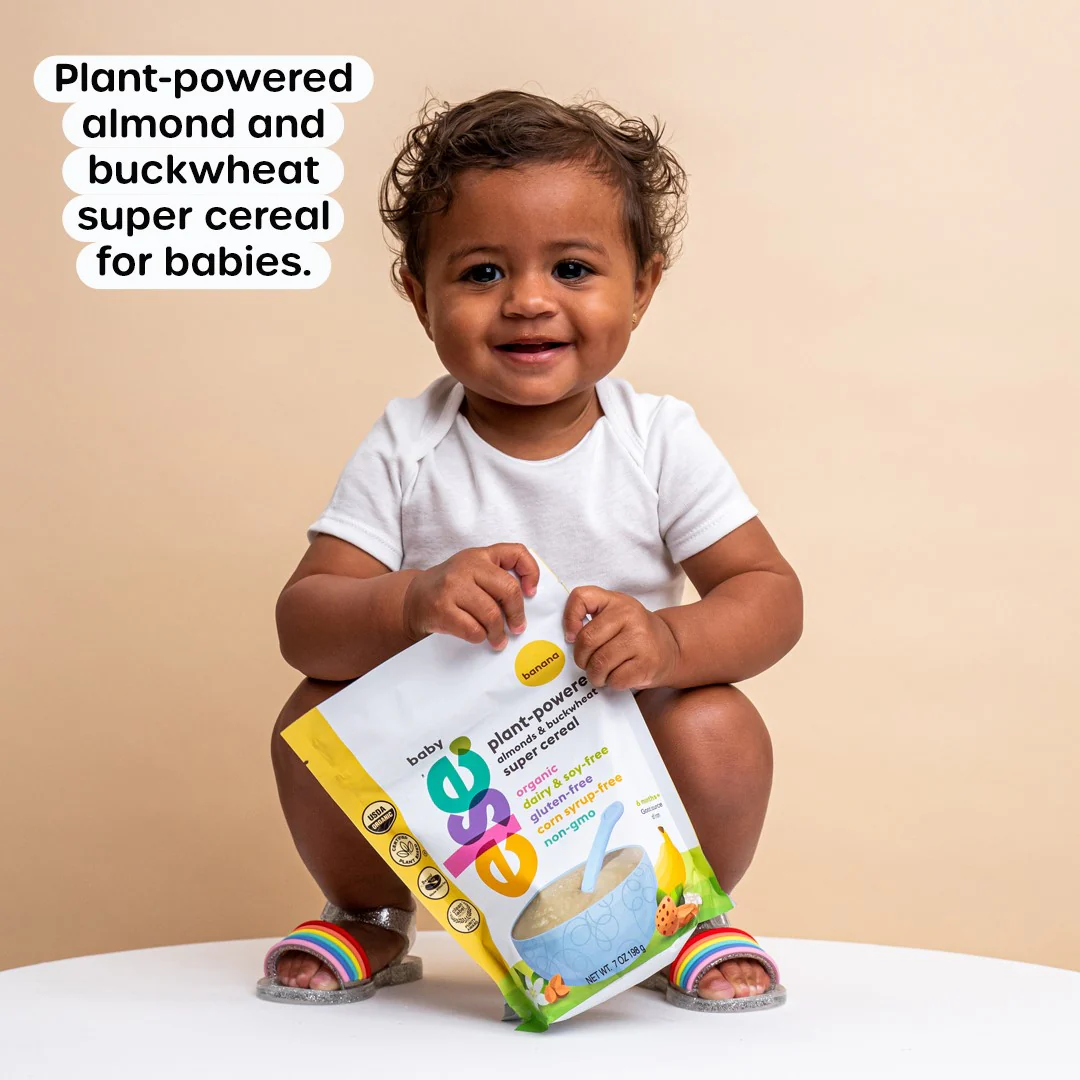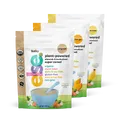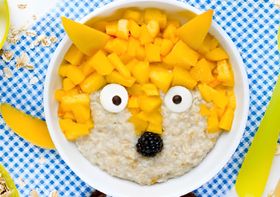What Type of Cereal to Start Baby On: Nutritious First Food
Introducing your baby to solid foods is an exciting milestone, but knowing what type of cereal to start your baby on can be overwhelming. Here's how to make the best choice for your baby's first meal.
Published August 29, 2024

Introducing solids is a significant milestone in your baby's development, and many parents are curious about what the best first baby cereals are to help their little one grow strong and healthy. Cereals often come up as the top recommendation for first solid foods, and there's good reason for that. Not only are they palatable and easy to digest, but they also provide essential nutrients that support your baby’s growth.
» Give your baby a nutritious start with clean, plant-based baby cereal
Why Baby Cereals Are a Smart First Food Choice
Here's why baby cereals make sense as the initial step into solids:
Easily Customizable
Baby cereals are versatile. You can adjust the consistency to match your baby's needs, making them thinner for beginners and thicker as your baby gets more comfortable with eating solids. This flexibility allows you to gradually introduce different textures as your baby grows.
A Safe Introduction to Grains
Single-grain cereals, such as rice or oatmeal, provide a safe and simple way to introduce your baby to grains. These cereals are less likely to cause reactions and can help you identify any sensitivities to specific grains early on.
Controlled Nutrition
When you start with baby cereal, you have control over what’s going into your baby’s diet. Whether you’re mixing it with breast milk, formula, or water, you can be sure your baby is getting balanced nutrition that’s easy to digest.
Supports Feeding Skills Development
Baby cereals help with developing essential feeding skills. From learning to eat from a spoon to practicing swallowing, these skills are foundational for future solid food adventures. Baby cereal’s smooth texture makes it a great way to ease into these new experiences.
» Explore more super cereal benefits
When to Introduce Solid Foods & Cereal to Your Baby
The American Academy of Pediatrics generally recommends introducing solid foods, including cereals, to a baby's diet around six months of age, when natural iron stores diminish. However, every baby is different. Some may be ready slightly earlier, while others might need to wait a bit longer.
» Understand the importance of iron in baby cereal
If your baby shows interest in your food—reaching for your plate or watching you eat—they may be ready to explore new tastes. Keep in mind that:
- Before introducing solids, ensure your baby can sit up with minimal assistance, which helps them eat safely and reduces the risk of choking.
- Additionally, your baby should have good head control, able to hold their head steady and upright, as this is essential for swallowing food properly and safely.
» Check out our complete guide to introducing solid foods & baby cereal
How Much Cereal to Feed Your Baby in the Initial Stages?
In the initial stages of introducing solids, let your baby dictate how much they want to eat. Start with small portions, such as one or two tablespoons of baby cereal mixed with breast milk, formula, or water. Gradually increase the portion size as your baby becomes more comfortable with eating solids.
Remember, during the first year, solids are meant to complement breast milk or formula, not replace them. According to the Centers for Disease Control and Prevention (CDC), parents should monitor their baby's intake and adjust portion sizes as they grow.
» Nourish your little one naturally with organic plant-powered baby cereal
How to Feed Your Baby Cereal
- Begin by mixing 1 tablespoon of iron-fortified, single-grain baby cereal with 4 tablespoons (60 milliliters) of breast milk or formula. For additional nutritional benefits, opt for cereals made from whole grains.
- Avoid feeding your baby from a bottle. Instead, help them sit upright and use a small spoon to offer the cereal once or twice a day, preferably after breastfeeding or a bottle. Start with 1 or 2 teaspoons.
- As your baby becomes more comfortable swallowing thin cereal, gradually thicken the mixture by using less liquid and slowly increase the portion size.
- Try introducing other single-grain cereals such as oatmeal, barley, or brown rice. Since rice can contain arsenic, avoid feeding your baby only rice cereal and steer clear of brown rice syrup or rice milk.
» Discover rice cereal alternatives for babies
How to Select a Cereal for Your Baby
Choosing the right cereal for your baby is an important decision. Here are some key factors to consider:
1. Prioritize Gentle Digestion
The cereal you choose should be easy for your baby to digest. Single-ingredient cereals, like rice or oatmeal, are often recommended because they are gentle on a baby’s digestive system. If your baby has trouble digesting certain foods, consult your pediatrician for guidance.
» Start solids the healthy way with plant-powered baby cereal: Gentle on tummies, rich in nutrients
2. Consider Nutritional Value
Beyond being a gentle first food, cereals should offer essential nutrients. Baby cereals rich in iron, B vitamins, zinc, and fiber support your baby's overall growth and development. Evaluate different brands to ensure the cereal provides a good balance of nutrients tailored to your baby’s needs.
» Discover the best baby cereal to give your baby a nutritious start
3. Look for Minimal Ingredients
Look for cereals with short ingredient lists. Ideally, you should recognize all the ingredients on the label. Avoid cereals with additives or artificial ingredients, as these can be harder for your baby to process.
4. Focus on Allergen Risk
When introducing solids, it’s essential to be mindful of potential allergens. Start with single-ingredient cereals to help identify any allergic reactions. For example, some babies may be allergic to grains like wheat or soy, so starting with a simple rice or oat cereal is often a safer choice.
» Uncover the potential downsides of rice cereal
5. Think About Convenience
Choose a cereal that’s quick and simple to prepare. Having a hungry baby means you want food ready fast. Opt for cereals that require minimal preparation to reduce stress during feeding time.
6. Tailor Texture and Taste to Your Baby’s Preferences
Your baby’s first solid food experience should be positive. Choose a cereal that is mild in flavor and easy to mix with breast milk or formula. This familiar taste can help your baby transition smoothly to solid foods.
7. Consider Special Diets and Preferences
If your baby has specific dietary needs or if your family follows a particular diet, such as vegan or gluten-free, there are cereals tailored to these preferences.
» Explore the best nutritious baby cereals with no heavy metals
What Type of Cereal to Start Baby On
When choosing the best first cereal for your baby, single-ingredient options like rice or oatmeal cereals are highly recommended. These cereals are gentle on the stomach, easy to prepare, and less likely to cause allergic reactions, making them an ideal starting point for introducing solid foods. However, there are many different options available:
Rice and Oatmeal Baby Cereal
Rice and oatmeal cereals are commonly fortified with iron, which is essential for cognitive development and preventing anemia in infants. They also provide fiber to support healthy digestion, along with B vitamins and zinc, which are crucial for overall growth and development.
Oatmeal cereals, in particular, have high fiber content, which promotes regular bowel movements and supports digestive health. Single-ingredient cereals are less likely to cause digestive upset compared to mixed cereals with multiple ingredients, making them a gentler option for your baby’s first food.
Barley Baby Cereal
Alongside rice and oatmeal, barley is another excellent single-grain option. It’s high in fiber and contains essential minerals like selenium and magnesium, which support various aspects of health, including the immune system and bone development.
Quinoa Baby Cereal
Quinoa is a nutrient-dense grain that offers more protein than traditional cereals. It's also naturally gluten-free, making it suitable for babies with sensitivities or parents who prefer gluten-free options.
Millet Baby Cereal
Millet is another grain that is easy to digest and less commonly known, but it can be a good alternative. It's rich in B vitamins and magnesium, promoting muscle and nerve function.
Organic Non-GMO Baby Cereals
More parents are seeking non-GMO organic options to avoid pesticides and other chemicals. They aremade from whole grains can be a safer choice, particularly for health-conscious families. Non-GMO organic cereals are free from genetically modified organisms, appealing to parents who prioritize natural and minimally processed foods for their children.
Plant-Based or Vegan Baby Cereals
For parents following a plant-based or vegan lifestyle, there are now cereal options that avoid animal products entirely. These plant-powered baby cereals are often fortified with essential nutrients like iron and vitamin B12 to ensure the baby receives balanced nutrition.
» Fuel your baby’s growth with the clean, allergen-free, nutritious cereal
Introducing Else Nutrition's Baby Super Cereal
If you're looking for a first baby cereal that aligns with modern parents' values of nutrition, safety, and sustainability, consider Else Baby Super Cereal. This cereal is made from clean, plant-based ingredients, offering a safe and nutritious option for your baby’s first solid food. Free from common allergens such as dairy, soy, and gluten, it’s a great choice for families concerned about food sensitivities.
Else Nutrition’s organic, plant-powered baby cereal is not only gentle on your baby’s stomach but also rich in essential nutrients like iron, B vitamins, and fiber. These nutrients are crucial for supporting your baby’s growth and development during their first year. The cereal is easy to prepare and has a palatable taste, making it easier for your baby to enjoy this new phase of their feeding journey.
» Explore the best organic cereals for Infants
Choosing the Right First Cereal for Your Baby’s Journey
Starting your baby on solid foods is a significant milestone. Choosing the right cereal, such as a single-ingredient option like rice or oatmeal, helps ensure that your baby’s first experience with solids is a positive one.
Always consult your pediatrician to confirm your baby is ready for solids, and consider nutritious, allergen-friendly options like Else Nutrition’s Baby Super Cereal to give your little one the healthiest start possible on their food journey.
The content and advice provided in this article are for informational purposes only and are not a substitute for medical diagnosis, treatment, or advice for specific medical conditions. Always consult a pediatrician to understand the individual needs of your child.




